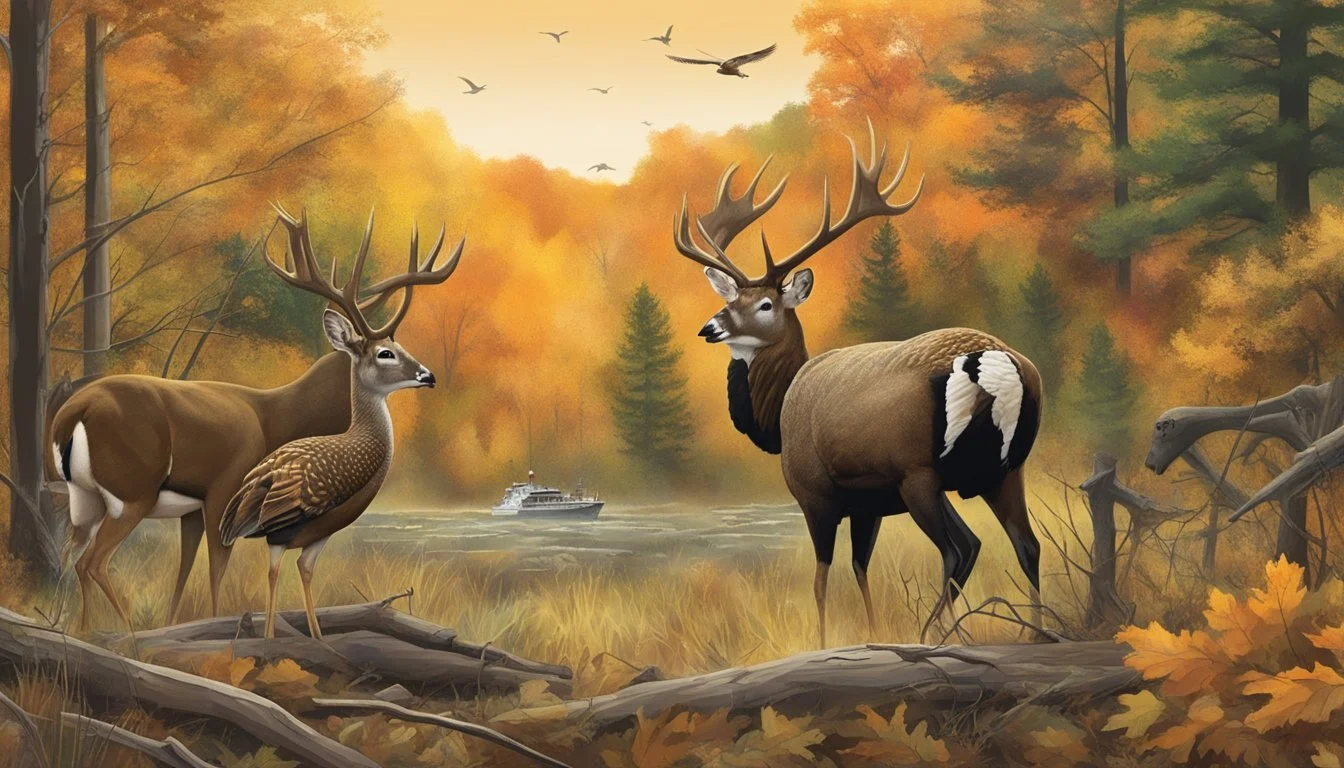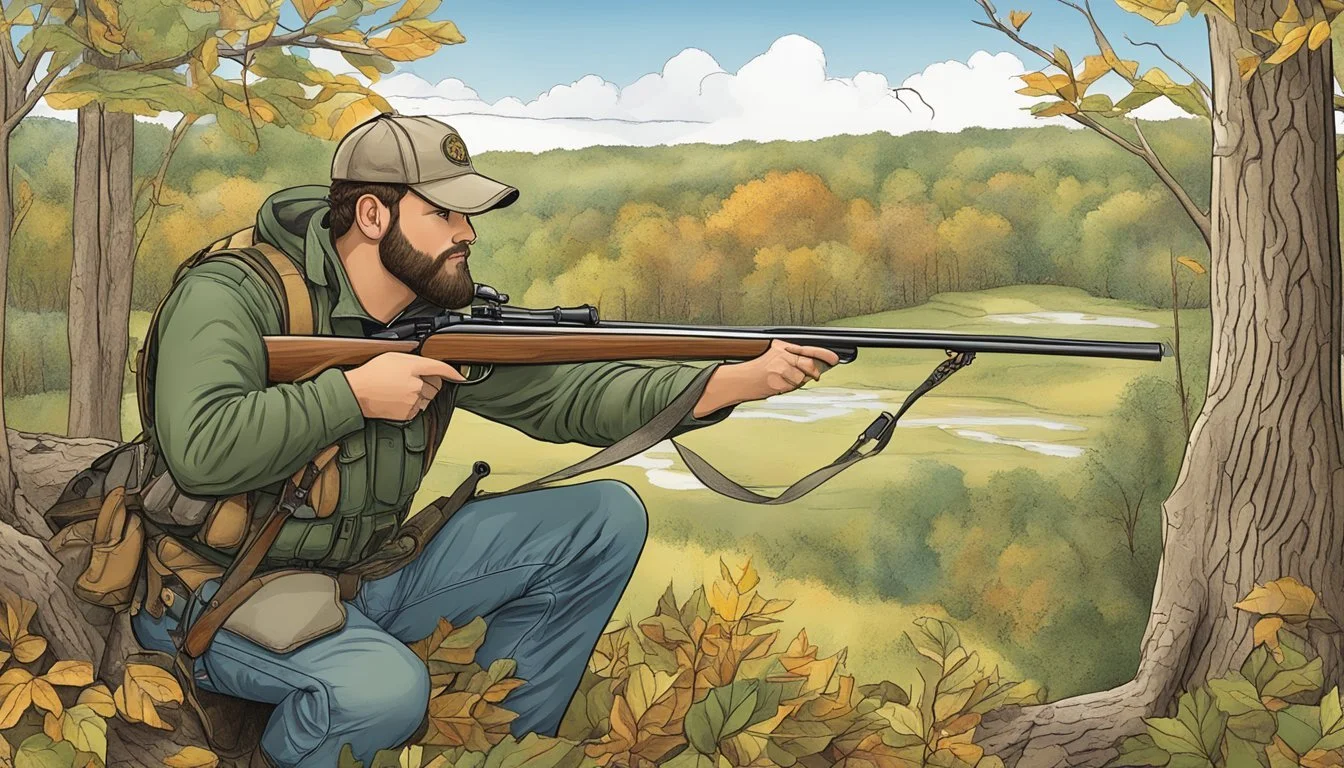Hunting Seasons in Missouri
Your Annual Guide to Game Dates
This Article is Part of Our Hunting Seasons Guide for All 50 US States
Missouri stands as a state with a robust tradition of hunting, offering diverse wildlife and ample public lands that cater to both seasoned hunters and those new to the sport. The state manages hunting seasons carefully to ensure a balance between conservation efforts and the opportunities for outdoor enthusiasts to participate in this time-honored practice.
The Department of Conservation in Missouri designates specific seasons for various species, including popular game such as deer and turkey (What wine goes well with turkey?), as well as waterfowl and other game birds. These seasons are structured to not only provide the best experience for hunters but also to maintain healthy populations of wildlife. Missouri's hunting regulations are detailed and are meant to be adhered to strictly to ensure that both the law and ethical hunting practices are followed.
Moreover, it's mandatory for hunters in Missouri to complete hunter education, which prepares them with essential knowledge of safe hunting practices and conservation principles before they embark on their hunting ventures. This education is a cornerstone of the state's commitment to safety, sustainability, and the overall success of hunting seasons year after year.
Overview of Missouri Hunting Seasons
Missouri offers a diverse array of wildlife, making it a destination for hunting enthusiasts. The Missouri Department of Conservation (MDC) regulates hunting seasons, usually setting them from the late summer of one year to early in the next. Detailed information, rules, and regulations can be accessed on MDC.mo.gov.
Hunting season dates vary by the species targeted:
Squirrel: The season typically runs from late May through mid-February.
Deer: Missouri is particularly known for its white-tailed deer hunting seasons, which include several portions such as archery, firearms, and alternative methods.
Turkey: There are both spring and fall seasons for turkey hunting, with specific dates announced by the MDC.
Small Game: This category includes species such as rabbits and quail, with their respective seasons.
For those interested in amphibian pursuits:
Bullfrog and Green Frog: The hunting season usually does not include the winter, opening at sunset on the specified start date and closing at the end of October.
Missouri's more than two million acres of public land are managed to provide ample hunting opportunities. In terms of bag limits and exact season start and end dates, hunters must consult the current year's Missouri hunting regulations or visit MDC.mo.gov.
In addition to the standard seasons, the MDC manages and monitors wildlife diseases, such as Chronic Wasting Disease (CWD), ensuring healthy populations and safe hunting experiences. Hunters must stay informed about such conditions which may affect hunting in certain counties.
Each species comes with its specific set of rules and potential restrictions, often in response to population management goals and ecological considerations. Compliance with Missouri hunting regulations is essential for a responsible and legal hunting experience.
Hunting Permits and Regulations
Missouri's Department of Conservation mandates hunters to have the appropriate hunting permits and adhere to specific regulations, ensuring sustainable wildlife management and safety. The permits required vary based on the season, species, and the hunter's age or residency status.
General Permit Requirements
In Missouri, hunters must obtain suitable permits before engaging in any hunting activities. Resident and non-resident sportsmen are required to procure these permits from the Missouri Department of Conservation. They must carry their permits at all times during hunting. Apprentice Hunter Authorization is essential for new hunters who can then hunt in the immediate presence of a qualified mentor.
Species-Specific Regulations
Deer hunting regulations include an antler-point restriction in certain counties and decreased antlerless permit numbers in most regions. This is to manage populations effectively. Likewise, turkey hunting is regulated with defined seasons, varying by spring and fall, each with its own set of limitations to promote responsible harvesting.
Hunting Restrictions
Some species have restrictions on when they can be hunted. For instance, hunting groundhog on public land is forbidden during the spring turkey season. Private land owners may have more leeway but must adhere to department guidelines. Daily and season bag limits apply to all hunted species.
Harvest Regulations
Harvest regulations dictate that hunters must check in their game, such as deer or turkey, by 10 PM on the day of capture. Bag limits are strictly enforced, with specific daily limits depending on the species and season. Violations of these regulations can result in fines and loss of hunting privileges.
Firearms and Equipment Guidelines
Various firearms and equipment are approved for hunting in Missouri. For deer hunting, permitted firearms include muzzleloading or cap-and-ball firearms, revolvers, and shotguns. Archery regulations permit the use of crossbows and longbows. The usage of these items is seasonally dependent and comes with strict safety rules.
Detailed Season Information
Missouri offers diverse hunting seasons to accommodate the varied wildlife and hunter preferences across the state. Specified dates, permits, and regulations ensure a sustainable and legal hunting experience.
Deer Hunting Seasons
Archery:
September 15 - November 12
November 24 - January 15
Firearms:
Youth Firearms: October 30 - October 31; November 26 - November 28
Antlerless Firearms: December 4 - December 12
November Portion: November 13 - November 23
Alternative Methods: December 25 - January 4
CWD management is a high priority in counties known for deer populations. Special seasons, like the CWD portion, may be introduced to address concerns.
Turkey Hunting Seasons
Spring Season:
Regular spring turkey season dates are established annually.
Fall Firearms Turkey Season:
Specific fall dates vary by year; refer to the Missouri Department of Conservation for current timelines.
Youth Hunt:
Dates for the Youth Hunt are typically set each year to encourage younger generations to participate in turkey hunting under supervision.
Small Game and Other Species
Squirrel:
Season runs May 27, 2023, through February 15, 2024.
Dove:
First of September through November, subject to change annually.
Groundhog, Opossum, Coyote, Fox:
Ongoing seasons, largely open year-round.
Waterfowl and Migratory Birds
Duck and Canada geese seasons depend on migration patterns and are divided into North, Middle, and South Zone dates, including areas like New Madrid and Pemiscot. These typically run from late fall into early winter. Specifics can be found via the MDC.
Furbearer Seasons
Trapping:
Varies by species, but generally falls within the colder months to accommodate fur primeness.
Hunting:
Bobcat, coyote, and fox have designated seasons, usually parallel to other small game timelines.
Managed Hunts:
Counties might have particular rules and managed hunts, especially for species requiring population control. Always check local regulations.
Special Hunting Opportunities and Conservation
Missouri offers distinct hunting programs that focus on youth education and wildlife conservation. These initiatives provide controlled hunting experiences and aim to sustain various wildlife populations across the state.
Youth Hunts and Education
Missouri is committed to fostering the next generation of hunters through youth hunts. These supervised events are designed not only to provide a safe and educational hunting experience, but also to instill a strong conservation ethic among young participants. A key feature of this program includes:
Youth Portions: Certain seasons, such as the deer and turkey seasons, have portions specifically reserved for young hunters. These youth portions often precede the regular adult seasons, providing exclusive opportunities for youth to hunt.
Youth hunting events are supported by a variety of hunting permits tailored to under-18 hunters. These permits are both accessible and encourage youth participation under the guidance of experienced adults.
Managed Hunts and Conservation Areas
Missouri's managed hunts are essential to the state's conservation efforts. These hunts are regulated to align with wildlife management objectives, such as population control and habitat maintenance. Notable aspects of these hunts include:
Conservation Areas: These carefully managed spaces provide controlled hunting scenarios to both nurture and sustain healthy animal populations.
The Missouri Department of Conservation spearheads the regulation of these areas, ensuring that hunting practices contribute positively to the conservation of the state's diverse ecosystems. Hunters participating in managed hunts contribute directly to Missouri's conservation goals through the pursuit of species such as white-tailed deer and wild turkey, under stringent biological management principles.
Hunting Techniques and Practices
Missouri offers diverse hunting opportunities, employing various techniques and equipment during specified seasons, to responsibly manage wildlife populations and maintain ecological balance.
Archery Hunting
Archery hunting in Missouri is a popular method, allowing the use of longbows, recurve bows, compound bows, and crossbows. Hunters often utilize hand-held string-releasing devices and can enhance their aim with illuminated sights, scopes, and quickpoint sights. The archery season for deer, for example, provides an extended timeframe for hunters seeking a more challenging and traditional hunting experience.
Firearms Hunting
During Missouri's firearms season, hunting with traditional firearms like rifles and shotguns is widely practiced. Specific regulations guide the appropriate calibers and ammunition to ensure ethical harvesting of wildlife. Muzzleloading firearms define a subcategory of this method, where hunters use period weaponry for a blend of tradition and modern conservation.
Alternative Methods Hunting
Alternative methods hunting includes the use of less conventional equipment such as atlatls, which are ancient spear-throwing devices, offering a unique challenge to enthusiasts. During designated seasons, Missouri even allows the use of handguns, including revolvers, under strict regulations to ensure safety and ethical practices in wildlife harvesting.
Trapping and Calls
Trapping in Missouri follows strict regulations to promote humane practices, employing cage-type traps and foot-enclosing traps. Effective use of calls mimics prey or distress sounds, facilitating the management of species like coyotes, which can be hunted throughout the year. This method requires an understanding of animal behavior for successful and ethical trapping.
Hunting Strategy and Ethics
Strategic considerations in hunting revolve around understanding animal habitats, movement patterns, and the ideal utilization of various methods for different species. Ethical hunters prioritize humane techniques focusing on quick, efficient harvests and often consume the meat from their hunts. Respect for conservation laws and private property is fundamental to maintaining the integrity of the sport and ensuring sustainable wildlife populations.
Location and Time Considerations
When planning a hunting trip in Missouri, it's essential to consider the location and the specific time regulations that apply. Localized county regulations and daily hunting hours based on sunrise and sunset times play a critical role in determining a successful and legal hunting experience.
Hunting by County
In Missouri, hunting regulations may vary significantly by county. For example, counties such as Dent, Iron, and Wright may have different rules regarding the hunting of specific species and the availability of antlerless deer permits. For instance:
Antlerless Deer Hunting: Restrictions on antlerless deer permits are in place for certain counties, including Dunklin, Mississippi, New Madrid, and Pemiscot. Hunters should check for antler-point restrictions that may affect counties such as Jefferson and Ozark.
Conservation Areas: Hunters should note that conservation areas may have distinct regulations, and some require special permits. Specific details for hunting on conservation lands, including prairies and forests, can be found through the Missouri Department of Conservation.
Understanding Sunrise and Sunset Regulations
Missouri enforces hunting regulations based on sunrise and sunset times, which not only ensure fair chase but also contribute to the safety of both hunters and non-hunters. These times dictate when hunters may legally begin and end their hunting activities each day, and they change throughout the year. Hunters are responsible for checking the precise sunrise and sunset times for their specific hunting location and date.
Hunting Hours: Generally, game birds and game mammals may be hunted from half an hour before sunrise to half an hour after sunset. Regulations may differ by species and during certain seasons.
Water and Banks: When hunting waterfowl, hunters must be especially mindful of legal shooting hours, which are often more restrictive and are tied closely to sunrise and sunset times.
In conclusion, Missouri hunters must stay informed about the timing and location-specific regulations that apply to their chosen hunting areas, including individual counties and different terrains, such as water bodies and conservation areas, to ensure a lawful and ethical hunting experience.
Safety Guidelines and Legal Compliance
Before venturing out into Missouri's hunting grounds, individuals must adhere to stringent safety guidelines and remain compliant with all hunting laws and regulations. These measures not only ensure personal and public safety but also uphold the integrity of the sport through ethical practice.
Safety Precautions
Firearms Handling: Hunters in Missouri are expected to practice safe firearms handling at all times. This includes:
Keeping the muzzle pointed in a safe direction.
Identifying the target and what is beyond it before shooting.
Keeping the finger off the trigger until ready to shoot.
Ensuring the firearm is unloaded when not in use.
Personal Safety Gear: It's also imperative for hunters to wear blaze orange attire for visibility, use safety harnesses when hunting from elevated platforms, and maintain communication with fellow hunters.
Legal and Ethical Compliance
Regulations and Laws: Missouri's Department of Conservation (MDC) provides a comprehensive set of rules for:
Game species-specific seasons and limits.
Prohibited practices, such as the use of bait for deer and turkeys.
County-specific restrictions, including antler-point regulations and chronic wasting disease (CWD) precautions.
Hunter Ethics: Ethical hunting is emphasized to ensure respect for wildlife and other hunters. Key ethical tenets include:
Obtaining proper licenses and permits.
Respecting property boundaries and other hunters.
Striving for quick, humane harvests.
Legal Requirements: Compliance with all state and local ordinances is mandated, and hunters should be aware of updates to regulations as they can change annually.
Frequently Asked Questions
This section addresses common inquiries regarding the hunting seasons in Missouri, focusing on deer, turkey, and waterfowl, and includes essential details about permits, seasons, and compliance with state regulations.
FAQs about Deer Hunting
When is the Missouri deer hunting season? Missouri deer season for hunting whitetail deer typically begins in mid-September and extends into mid-January. Specific dates can vary each year.
Is it permitted to harvest bucks during all seasons? Hunters are allowed to harvest bucks during designated portions of the season, which includes archery and firearms seasons, subject to antler-point restrictions in certain counties.
FAQs about Turkey and Waterfowl
What are the turkey hunting seasons in Missouri? Turkey hunting seasons in Missouri include a spring season, generally starting in April, and a fall season, which varies by year. Specific dates should be confirmed each season.
Can hunters pursue waterfowl throughout the year? No, waterfowl hunting is subject to migratory patterns and federal regulations, with seasons typically set for specific times during the fall and winter months.
FAQs about Permits and Seasons
What types of permits are required for hunting in Missouri? Hunters must possess valid permits, which include Resident or Nonresident Hunting Permits and may also require species-specific permits for deer, turkey, or waterfowl.
Resident Permit: Must present proof of residency.
Nonresident Permit: Available for out-of-state hunters.
Can permits be acquired for all seasons? Permits are generally available for purchase before and during the various hunting seasons but may have deadlines or quotas, especially for special hunts or managed hunts.
FAQs about Regulations and Restrictions
What are the key hunting regulations one should be aware of in Missouri? Hunters must adhere to bag limits, hunting area restrictions, and must not use prohibited methods such as baiting or night vision equipment during hunting.
Are there any specific restrictions for deer hunting? Yes, Missouri imposes antler-point restrictions in certain counties, hunter ethics guidelines, and county-specific antlerless deer hunting restrictions to manage the deer population responsibly.
Appendix and Resources
This section provides essential materials and references to enhance the reader's understanding and preparedness for hunting seasons in Missouri. Here, readers can access official regulations, familiarize themselves with hunting terminology, and find comprehensive guides for a well-planned hunting expedition.
Links to Regulations and Resources
Missouri Department of Conservation (MDC): For definitive and up-to-date information on hunting seasons, visit MDC.mo.gov.
Missouri Hunting Regulations: A complete guide to hunting rules, including seasons and valid permits, can be viewed on the Missouri Department of Conservation's hunting regulations page.
eRegulations: For electronic access to hunting licenses and detailed state-specific regulations, explore Missouri's section on eRegulations.
Glossary of Hunting Terms
A glossary is an invaluable resource for both novice and experienced hunters to clarify terminology used in regulations and when discussing various aspects of hunting. Key terms include:
Bag Limit: The maximum number of a specific game species that a hunter may harvest in a given period.
Check Station: A designated site where hunters must report their harvest for data collection and compliance with game management.
Checklists and Preparation Guides
Proper preparation is crucial for a successful and legal hunting trip. Checklists can ensure that hunters have all necessary gear, licenses, and permits before setting out. Key resources for preparation include:
Pre-Hunt Checklist: Prioritize safety gear, valid hunting permits, and appropriate seasonal clothing.
Hunting Area Maps: Available from MDC, detailed maps assist with navigation and understanding of the hunting zones.
Species-Specific Strategies: Different game species require tailored techniques and knowledge of their habits and habitats.
Contact Information
For hunters needing assistance or information, the Missouri Department of Conservation provides tailored contact options, including direct communication channels and various hotlines for urgent reporting needs.
Missouri Department of Conservation Contact
General Inquiries:
Phone: 573-751-4115
Mail: P.O. Box 180, Jefferson City, MO 65102
Email: Contact form available on the official website
Headquarters Office:
Address: 2901 W. Truman Blvd., Jefferson City, MO 65109
Reporting and Assistance Hotlines
Wildlife Code Violations:
Operation Game Thief: 1-800-392-1111
Anonymous reporting of poaching or illegal hunting.
Wildlife Emergencies or Nuisances:
Wildlife Conflict Hotline: 1-855-452-5437
Assistance available from Monday to Friday, 8 a.m. – 8 p.m.
Disease Reporting:
Carcass Disposal/Chronic Wasting Disease (CWD) Reporting: Specific numbers listed by county on the official website.
For additional support, individuals can visit the Missouri Department of Conservation's official website, which offers comprehensive guides, regulation details, and educational materials.
Conservation and Wildlife Management
Missouri takes a structured approach to conservation and wildlife management, encompassing a variety of strategies to maintain ecological balance and foster sustainable use of natural resources. The Missouri Department of Conservation (MDC) plays a pivotal role in this, implementing regulations that are vital to the welfare of wildlife populations.
Regulatory Framework
The MDC develops hunting seasons that are crucial for the control of wildlife populations, ensuring they align with environmental carrying capacities and societal values. These seasons are carefully scheduled to minimize impacts on wildlife breeding cycles and overall ecosystem health.
Deer: Managed to help control populations and prevent overbrowsing, which can severely affect forest regeneration and biodiversity.
Waterfowl: Seasons and limits are established in concert with federal guidelines to protect migratory patterns.
Small Game: Includes species like rabbits and squirrels, with seasons set to avoid nesting periods and ensure population stability.
Habitat Management
Missouri's hunting regulations are designed to conserve critical habitats, safeguarding the diversity of the state's ecosystems. Hunters contribute to this through permit fees and by following established seasons and methods, which help to prevent illegal take and habitat destruction.
Wildlife Diseases
Part of Missouri's management strategy includes monitoring and controlling wildlife diseases, such as Chronic Wasting Disease (CWD) in deer. The MDC requires mandatory testing in certain counties to prevent its spread, demonstrating a proactive stance on wildlife health.
Through these efforts, Missouri maintains a balance between the needs of its environment and the interests of sportsmen and women, showcasing a commitment to conservation and responsible wildlife management.
Ethics and Responsibility
When engaging in hunting activities in Missouri, hunters are expected to adhere to a code of ethics and responsibility to ensure sustainable practices and respect for wildlife. Ethical hunters recognize the importance of:
Respect for Nature: They treat the outdoors with reverence, maintaining the ecological balance, and avoiding any harm to non-target species.
Private Property: Obtaining permission from landowners before hunting on their land and treating it with the same care as one’s own property.
Safety Measures: Confirming their target and what lies beyond before shooting, and maintaining their equipment in safe, working condition.
A responsible hunter's checklist might include:
Ethical Aspect Checklist Item Permission Obtain written consent to hunt on private lands. Identification Positively identify the target species before taking a shot. Equipment Inspection Regularly check and service hunting equipment and firearms. Knowledge of Regulations Stay updated with Missouri hunting regulations and adhere to them.
Additionally, they are committed to:
Educating themselves about local wildlife and habitat conservation efforts.
Practicing fair chase principles, where animals are not unduly pressured or given an unfair advantage.
Contributing to the conservation of natural habitats and wildlife populations through ethical practices.
Applying these principles, Missouri hunters display a conscientious approach that balances their passion for the sport with a commitment to environmental stewardship and community respect.
About the Author
The author, Vickie Lewin, published an insightful guide on September 19, 2023, detailing Missouri's hunting seasons. She has established herself as a credible source of information within the field of wildlife management and conservation.
Experience Qualifications Outdoor Writer Expert in regional wildlife regulations Hunting Enthusiast Experienced in Missouri hunting practices Conservation Advocate Deep understanding of seasonal impacts on wildlife
Vickie frequently contributes to publications that focus on outdoor activities. Her work emphasizes the importance of ethical hunting and adherence to conservation laws. Her articles are tailored to both novice and experienced hunters, providing them with updates on regulations and best practices. She maintains a neutral stance, aiming to inform rather than persuade.
Her commitment to clear and factual reporting helps ensure that her readers are well-prepared for their hunting seasons. She advocates for responsible hunting, ensuring that her guidance aligns with the Missouri Department of Conservation's objectives to sustain and protect local wildlife populations. Through her writing, she has become a respected voice, trusted for her reliable and knowledgeable insights.
Closing Thoughts
Hunters in Missouri have observed a promising shift in deer population management, with doe harvest percentages increasing, indicating a focus on maintaining a healthy and balanced deer ecosystem. The Missouri Department of Conservation’s diligent updates to the hunting regulations underscore their commitment to conservation and effective wildlife management.
They provide clear expectations for each hunting season, including the 2023-2024 season, guiding hunters to contribute positively to the state's wildlife objectives. The record harvest projected for Missouri not only reflects the success of past regulations but also sets a precedent for future seasons. It is imperative for hunters to stay informed on annual changes to ensure they comply with the updated guidelines and sustain the thriving hunting tradition of Missouri.
Key Points to Remember for the 2023-2024 Missouri Hunting Season:
Check updates regularly: Regulations can change, and staying informed is a hunter’s responsibility.
Record harvests: Participation contributes to state wildlife management goals.
Balance: The increase in doe harvests shows a shift towards a balanced deer population.
As the current season advances, hunters are encouraged to maintain this progress through ethical hunting practices and continued support of wildlife conservation efforts. The future of hunting in Missouri looks bright, thanks to the collective commitment of its hunting community and the guidance of the Missouri Department of Conservation.









